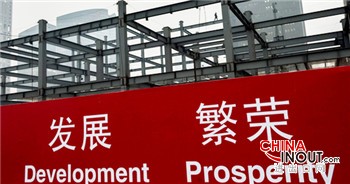當(dāng)中國(guó)宣布將在亞洲發(fā)起設(shè)立一家全新的地區(qū)開發(fā)銀行時(shí),實(shí)話說,,當(dāng)時(shí)的全球輿論對(duì)此是有分歧的,。
在危言聳聽的悲觀論者——其中許多來自美國(guó)政府和國(guó)會(huì)——看來,創(chuàng)立亞洲基礎(chǔ)設(shè)施投資銀行(AIIB,,簡(jiǎn)稱亞投行)是北京方面攫取權(quán)力之舉。美國(guó)官員抱怨,,亞投行相當(dāng)于經(jīng)濟(jì)領(lǐng)域的中國(guó)海軍——這支海軍正在南中國(guó)海耀武揚(yáng)威,。以英國(guó)為首的其他西方國(guó)家政府決定加入亞投行、使北京影響力得到提升的舉動(dòng)也讓這些官員感到困惑,。
樂觀派則認(rèn)為,,亞投行代表著中國(guó)向公開透明邁進(jìn)了一步。長(zhǎng)期以來,,中國(guó)一直在將其龐大的外匯儲(chǔ)備資金貸給一些開發(fā)項(xiàng)目,,這類單邊貸款活動(dòng)缺乏透明度。此外,,成員廣泛,、包括57個(gè)創(chuàng)始國(guó)政府的亞投行,或許可以在美國(guó)主導(dǎo)的,、僵化的世界銀行(Word Bank)之外提供一個(gè)受歡迎的選擇,。
亞投行候任行長(zhǎng)金立群在接受英國(guó)《金融時(shí)報(bào)》采訪時(shí)發(fā)表的言論,可以為雙方的觀點(diǎn)都提供一些支持,。
金立群淡化了歐洲國(guó)家對(duì)亞投行治理的影響,,稱在英國(guó)及其他發(fā)達(dá)國(guó)家政府決定加入之時(shí),亞投行的協(xié)議條款已基本擬定,,這種說法或許令人擔(dān)憂,。較為可喜的是,他也承諾亞投行的放貸活動(dòng)將遵守嚴(yán)格的環(huán)境和社會(huì)標(biāo)準(zhǔn),,并且將比世行更快捷,、更靈活,。
對(duì)其他各國(guó)政府而言,如果他們被當(dāng)作遮羞布加以利用,,以遮掩旨在推進(jìn)中國(guó)利益的貸款活動(dòng),,那么他們應(yīng)該不會(huì)繼續(xù)留在亞投行理事會(huì)。簡(jiǎn)化官僚做派并不等于消滅透明度,。非政府組織的活動(dòng)人士——不論在富裕國(guó)家還是新興國(guó)家——盡管有時(shí)觀點(diǎn)尖銳而片面,,但他們通過監(jiān)督發(fā)展機(jī)構(gòu)的活動(dòng),能夠促使這類機(jī)構(gòu)保持誠(chéng)實(shí)公正的作風(fēng),。如果中國(guó)希望通過邀請(qǐng)其他國(guó)家加入而使其貸款活動(dòng)具有合法性,,就應(yīng)接受這些國(guó)家?guī)淼耐该鞫葮?biāo)準(zhǔn)。
然而,,如果亞投行能夠做到將高放貸標(biāo)準(zhǔn)與快捷放貸結(jié)合起來,,它將成為其他機(jī)構(gòu)(尤其是世行)進(jìn)行改革時(shí)的有益榜樣。
雖然世行幾十年來樹立起了作為專家意見中心的聲譽(yù),,其放貸活動(dòng)卻也滋生了嚴(yán)重的官僚作風(fēng),。金立群準(zhǔn)確無誤地指出了世行的一處弊端,他認(rèn)為這是亞投行要避免的:常設(shè)的執(zhí)行理事會(huì)頻繁開會(huì),,有時(shí)一周開好幾次,,并且事無巨細(xì)地管理該行的活動(dòng)。推動(dòng)眾多決策通過被繁文縟節(jié)包圍的狹窄通道的需要,,經(jīng)常阻礙世行對(duì)各種挑戰(zhàn)做出快速反應(yīng),。給管理層更多自由,將理事會(huì)的角色限定于制定戰(zhàn)略和行使監(jiān)督職能,,應(yīng)該有助于打造一個(gè)責(zé)任明確,、有效率的機(jī)構(gòu)。
目前來看,,亞投行更像是一項(xiàng)試點(diǎn)工程,,而非羽翼豐滿可替代世行的機(jī)構(gòu)。由于這家新機(jī)構(gòu)將需要若干年時(shí)間來提高其放貸能力,,最初它可能帶來的只是一種競(jìng)爭(zhēng)性的新治理模式,,而非數(shù)量更大的貸款。
不過,,這本身就可以服務(wù)于一個(gè)有價(jià)值的目的,。亞投行通過承諾將放貸速度與高標(biāo)準(zhǔn)結(jié)合起來,在初始階段就發(fā)出了令人鼓舞的信息,。其股東國(guó)政府有機(jī)會(huì)去樹立新標(biāo)準(zhǔn)和好榜樣,。(中國(guó)進(jìn)出口網(wǎng))

It is fair to say that global opinion was somewhat divided when China announced it was creating a brand new regional development bank in Asia.
For the gloom-mongers, many of whom reside in the US administration and Congress, the creation of the new Asian Infrastructure Investment Bank represents a power-grab by Beijing. It is, US officials mutter, the economic counterpart to the Chinese navy throwing its weight around in the South China Sea, and they are baffled that other western governments, led by the UK, have decided to bolster Beijing’s influence by joining it.
For optimistic souls, the AIIB represents a move towards transparency by China, which has long lent out its vast foreign exchange reserves for development projects unilaterally and without transparency. With a wide membership, including 57 founding governments, the institution may also provide a welcome alternative to the sclerotic and US-dominated World Bank.
Remarks in an interview with the Financial Times from the AIIB’s new head, Jin Liqun, will give some ammunition to both sides.
Perhaps worryingly, Mr Jin played down the impact of European influence on the institution’s governance, saying that by the time the UK and other developed economy governments had decided to join, the bank’s articles of agreement had more or less been written. More optimistically, he also pledged that the bank’s lending would adhere to tough environmental and social standards, while being faster and more nimble than the World Bank.
Other governments should not remain on the AIIB’s board if they are being used as a figleaf to cover lending made to further Chinese interests. Streamlining bureaucracy is not the same as eliminating transparency. Shrill and one-sided though their views sometimes are, campaigners in non-governmental organisations in both rich and emerging countries have helped to keep development institutions honest by scrutinising their activities. If China wants legitimacy for its lending by inviting in other countries, it should accept the norms of transparency that they bring with them.
Yet if the AIIB can manage to combine high lending standards with moving money quickly out of the door, it will serve as a useful model for how other organisations, notably the World Bank, might reform.
Although the World Bank has established a reputation as a centre of expertise over the decades, its lending operations have gathered an accretion of bureaucracy. One weakness in particular has correctly been identified by Mr Jin as a mistake to avoid in the AIIB — a resident executive board that meets frequently, sometimes several times a week, and micromanages the bank’s activities. The need to push so many decisions through a narrow gap snarled with red tape has often prevented the World Bank from reacting quickly to challenges. More freedom for management, with the board’s role limited to setting strategy and exercising an oversight function, should be able to combine accountability with efficiency.
For the moment, the AIIB is more of a pilot project rather than a full-blown alternative to the World Bank. Since the new institution will take several years to ramp up its lending capacity, it is initially likely to provide a rival model of governance rather than offering a greater volume of disbursement.
That by itself, however, could serve a valuable purpose. The AIIB has made some encouraging noises early on with its commitments to combining lending speed with high standards. Its shareholder governments have the chance to set a new standard and a good example.











